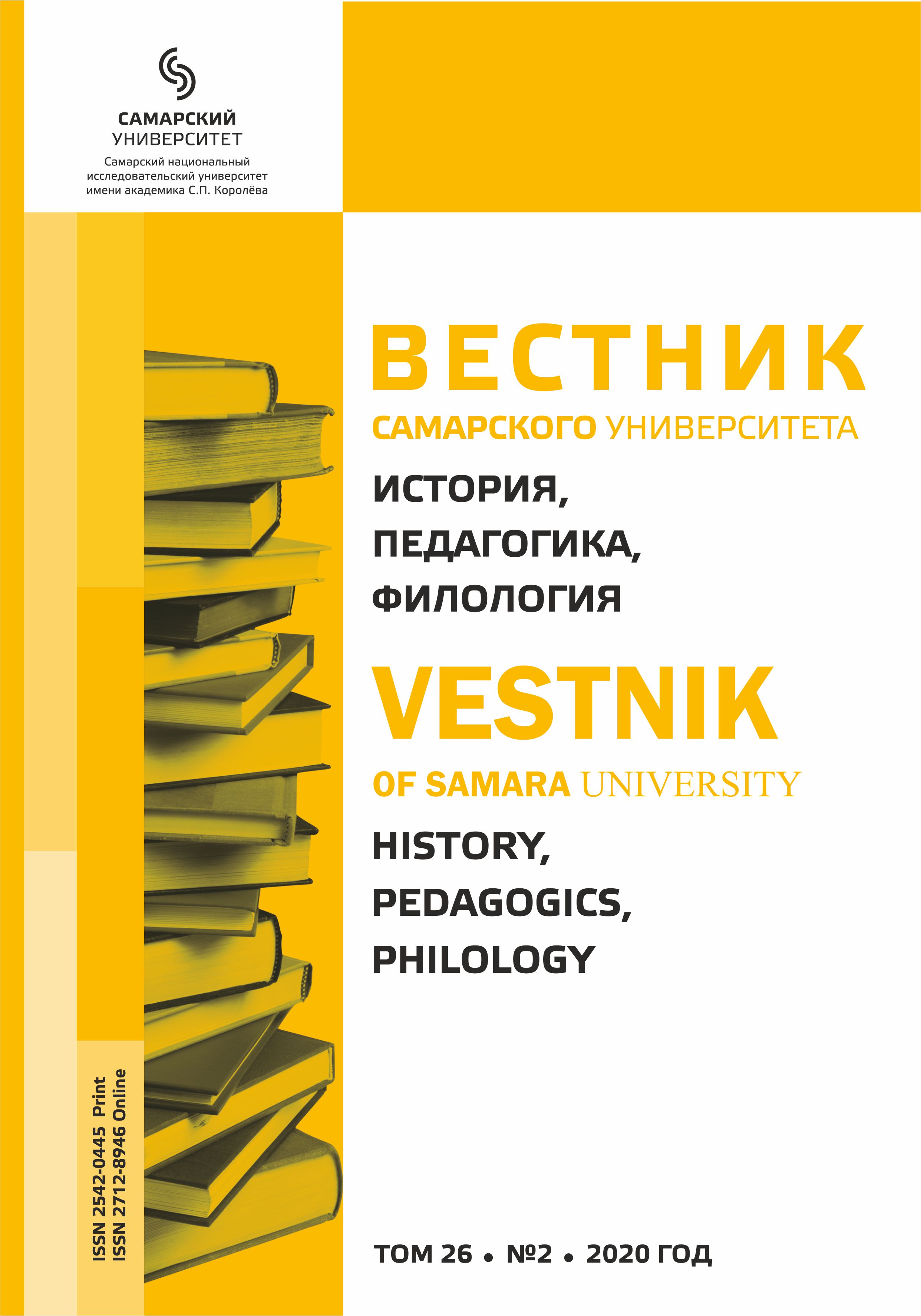Physical well-being of teachers as a factor in the effectiveness of their professional activities
- Authors: Vinogradova G.A.1, Chapala T.V.1, Ilich M.1
-
Affiliations:
- Togliatti State University
- Issue: Vol 26, No 2 (2020)
- Pages: 79-83
- Section: Articles
- URL: https://journals.ssau.ru/hpp/article/view/7875
- DOI: https://doi.org/10.18287/2542-0445-2020-26-2-79-83
- ID: 7875
Cite item
Full Text
Abstract
The urgency of the problem in the present study is associated with dramatic changes in the system of contemporary Russian education, which, on the one hand, are positive, and on the other contribute to emotional stress. Teacher, experiencing a state of stress, negatively affects students, transferring their negative emotions and often exerting a negative impact. Even those teachers who try to resist are also prone to burnout and psychosomatic diseases in these conditions. The article is devoted to the identification and analysis of cognitive and emotional changes of teachers, and their correlation with nosological form of cardiovascular disease, identifying the features of psychological, emotional states depending on earlier diagnosis. Mental status of the teacher is reflected in his personality changes in behaviour. The materials are based on the results of studies of physical well-being of teachers and its impact on the quality of the solution of pedagogical tasks. The study was conducted on the basis of the therapeutic department of the polyclinic № 1 in Togliatti. Experimental data confirm that stressful situations characteristic of the educational activities provoke diseases, which are a response to external negative impacts.
About the authors
G. A. Vinogradova
Togliatti State University
Author for correspondence.
Email: morenov@ssau.ru
ORCID iD: 0000-0001-8717-9880
Doctor of pedagogical Sciences, Professor, Department of Preschool Pedagogy, Applied Psychology
T. V. Chapala
Togliatti State University
Email: morenov@ssau.ru
ORCID iD: 0000-0003-2658-2793
Candidate of pedagogical Sciences, associate Professor, Department of Preschool Pedagogy, Applied Psychology
M. Ilich
Togliatti State University
Email: morenov@ssau.ru
ORCID iD: 0000-0001-8717-9880
tudent, Master’s Degree program, Department of Preschool Pedagogy, Applied Psychology
References
- Brown 1999 – Brown J. (1999) Psychosomatic approach. In: Psychosomatics: Relationship of the psyche and health: reader. Minsk: Kharvest, 640 p. Available at: https://b-ok.cc/book/2964254/e3c99b. (In Russ.)
- Broytigam, Christian, Rad 1999 – Broytigam V., Christian P. and Rad M. (1999) Psychosomatic medical science. Moscow: GEOTAR MEDITsINA, 376 p. Available at: http://www.samomudr.ru/d2/Brojtigam%20V.,%20Kristian%20P.,%20Rad%20M.%20-%20Psixosomaticheskaja%20medicina%20-%201999.pdf. (In Russ.)
- Burlachuk, Korzhova 1992 – Burlachuk L.F. and Korzhova E.Yu. (1992) Individual psychological characteristics of patients with cardiovascular diseases in the process of social adaptation. Psychological Journal, vol. 13, no. 3, pp. 112–120. Available at: https://elibrary.ru/item.asp?id=21234959. (In Russ.)
- Vinogradova 2010 – Vinogradova G.A. (2010) Climate in the pedagogical collective and subjective well-being of the teacher: monograph. Togliatti: TGU, 100 p. Available at: https://elibrary.ru/item.asp?id=18500099. (In Russ.)
- Vodopyanova, Starchenkov 2009 – Vodopyanova N.E., Starchenkov E.S. (2009) Burnout syndrome. Saint Petersburg: Piter, 2009. 140 p. Available at: http://kingmed.info/media/book/3/2930.pdf. (In Russ.)
- Ermolaeva., Lubovsky 2017 – Ermolaeva M.V., Lubovsky D.V. (2017) Teacher’s psychological well-being in the context of psychological culture. Vestnik TvGU. Seriya «Pedagogika i psikhologiya» = Herald of Tver State University. Series «Pedagogy and Psychology», no. 3, pp. 92–97. Available at: https://elibrary.ru/item.asp?id=29930267. (In Russ.)
- Zausenko 2012 – Zausenko I.V. (2012) Psychological well-being of the teacher. Pedagogical education in Russia, no. 2, pp. 28–31. Available at: https://elibrary.ru/item.asp?id=17762407. (In Russ.)
- Zenina 2012 – Zenina S.R. (2012) Features of teaching employees’ subjective wellbeing in the professional sphere. Theory and Practice of Social Development, no. 5, pp. 127–129. Available at: http://teoria-practica.ru/rus/files/arhiv_zhurnala/2012/5/psix%D0%BEl%D0%BEgiy%D0%B0/zenina.pdf. (In Russ.)
- Ilyin 2007 – Ilyin E.P. (2007) Emotions and feelings. 2nd edition. Saint Petersburg: Piter, 783 p. Available at: http://transyoga.ru/assets/files/books/psychology/emocii_i_chuvstva.pdf. (In Russ.)
- Izard 1999 – Izard C.E. (1999) The Psychology of Emotions. Saint Petersburg: Piter-Press, 360 p. Available at: http://library.kpi.kharkov.ua/files/new_postupleniya/kerrolizard.pdf. (In Russ.)
- Karapetyan, Glotova 2018 – Karapetyan L.V., Glotova G.A. (2018) Studying the relationship of emotional-personal well-being with professional burnout. Bulletin of the Moscow Region State University. Series: Psychology, no. 1, pp. 40–52. doi: 10.18384/2310-7235-2018-1-40-52. (In Russ.)
- Kayasheva, Vinogradova 2018 – Kayasheva O.I. Vinogradova G.A. (2018) Factors of mental burnout of professors of the higher school. In: Practical psychology in Russia and abroad: collection of scientific works of the Russian University of transport (MIIT). Saint Petersburg, 2018, pp. 43–49. Available at: https://elibrary.ru/item.asp?id=35205694. (In Russ.)
- Mitina, Mitin, Anisimova 2005 – Mitina L.M., Mitin G.V., Anisimova O.A. (2005) Professional activities and the health of the teacher. Moscow: Akademiya, 168 p. Available at: https://elibrary.ru/item.asp?id=19961226. (In Russ.)
- Nikiforov, Avgustova 2009 – Nikiforov G.S., Avgustova L.I. (2009) Health criteria. Uchenyye zapiski Sankt-Peterburgskogo gosudarstvennogo instituta psikhologii i sotsialnoy raboty = Scientifc Notes Journal of St. Petersburg State Institute of Psychology and Social Work, vol. 11, no. 1, pp. 92–98. Available at: https://elibrary.ru/item.asp?id=12448839. (In Russ.)
- Sechenov 1995 – Sechenov I.M. (1995) Psychology of behavior: selected psychological works. Moscow: Izdatel’stvo «Institut prakticheskoi psikhologii», 164 p. (In Russ.)
- Timofeeva 2017 – Timofeeva A.I. (2017) Identification of level of subjective wellbeing of teachers in education. In: Social and pedagogical challenges of modern society. Problems. Prospects. Ways of Development: materials of the 3rd International research and practical conference. Bryansk: BGU im. Akademika I.G. Petrovskogo, pp. 306–310. Available at: https://elibrary.ru/item.asp?id=30020788. (In Russ.)
- Formanyuk 1994 – Formanyuk T.V. (1994) Emotional burnout syndrome as an indicator of professional disadaptation of the teacher. Voprosy psikhologii, no. 6, pp. 57–64. Available at: http://www.voppsy.ru/issues/1994/946/946057.htm. (In Russ.)
- Chapala 2015 – Chapala T.V. (2015) Differential diagnostic psychological characteristics of patients with ischemic heart disease and myocardial infarction. Neurology Bulletin, vol. XLVII, no. 3, pp. 43–46. doi: 10.17816/nb13938. (In Russ.)
- Chapala 2017 – Chapala T.V. (2017) Category, standards and research methods of research in health psychology. Scientific vector of the Balkans, 2017, no. 1, pp. 35–38. Available at: https://elibrary.ru/item.asp?id=36644439. (In Russ.)
Supplementary files













